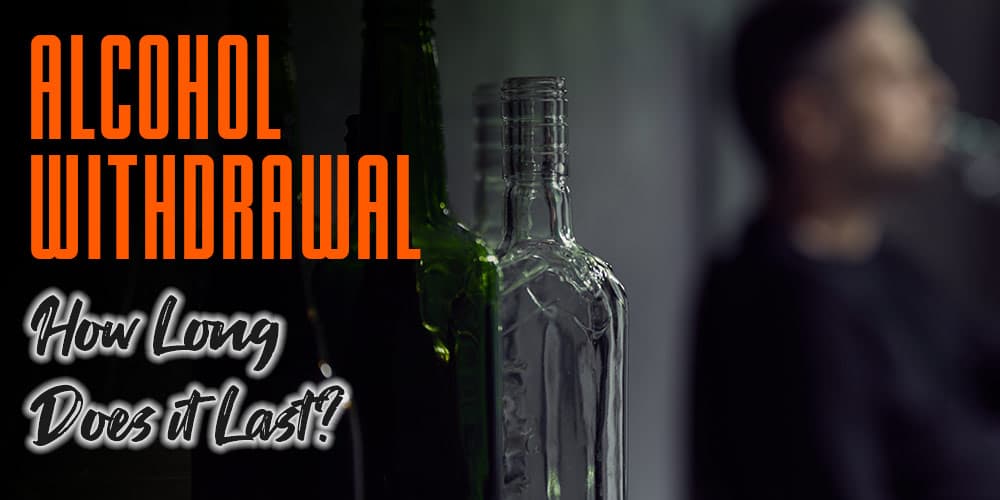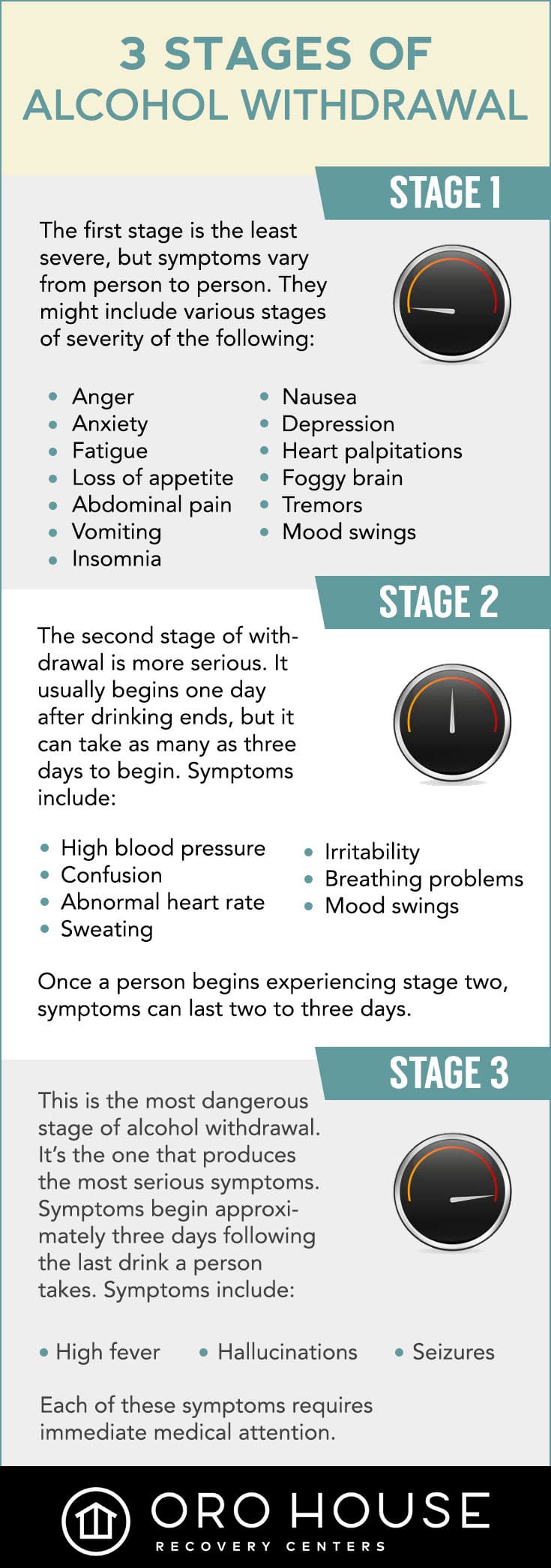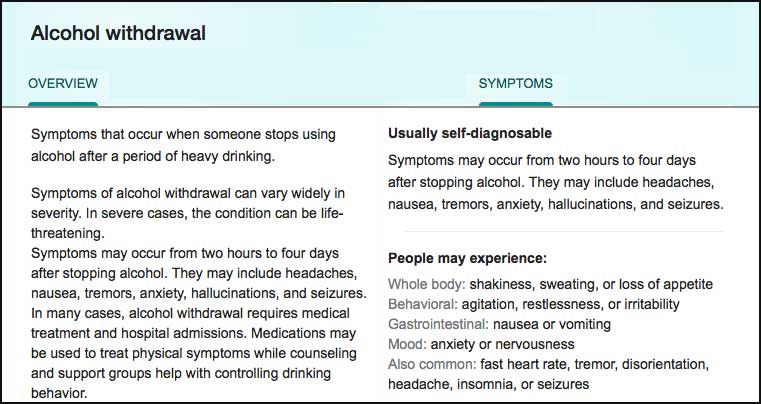
Alcohol withdrawal is just as dangerous as alcoholism. Alcoholics and their loved ones often mistake it for a simple side effect associated with recovery. Withdrawal is life-threatening for many alcoholics, and the immediate risks often outweigh the benefits.
It seems counterintuitive to suggest those with an addiction to alcohol avoid quitting to minimize their risk of withdrawal, but medical professionals recommend detoxing in a supervised medical facility.
Withdrawal begins approximately 8 hours after the last drink, but can occur as quickly as two hours after a person gives up drinking. It lasts anywhere from a week to several weeks depending on the severity of its symptoms.
Alcohol Withdrawal Stages – Does Everyone Suffer from Withdrawal?
Understanding withdrawal is challenging. It’s not always the same for alcoholics. There are three stages to alcohol withdrawal, but not everyone experiences all of them, any of them, or a combination when they quit drinking. There are too many factors that work together to determine whether an alcoholic will experience any symptoms of alcohol withdrawal syndrome when quitting. These factors include:
- Family history of alcohol abuse
- How long someone has been an alcoholic
- How much someone drinks
- What someone drinks
- Presence of other health issues
- How much stress alcoholics suffer
- Medical history
An alcoholic affected by alcohol addiction every day for more than a decade is more likely to be impacted by withdrawal symptoms than a person who has only had a dependence for a few months. Someone with mental health disorders is more likely to experience withdrawal symptoms than someone with a clean bill of health. It’s impossible to predict who will experience the symptoms of withdrawal, or if the side effects will be serious.

The First Stage of Alcohol Withdrawal Symptoms
Alcohol withdrawal symptoms begin when an alcoholic quits drinking. It might begin anywhere from two hours to a solid day after someone consumes that last beverage.
The average amount of time it takes someone to begin showing signs of withdrawal is 8 hours. The first stage is the least severe, but symptoms vary from person to person.
Alcohol withdrawal symptoms include various stages of severity of the following:
- Anger
- Anxiety
- Fatigue
- Loss of appetite
- Abdominal pain
- Vomiting
- Insomnia
- Nausea
- Depression
- Heart palpitations
- Foggy brain
- Tremors
- Mood swings
While not everyone experiences the first stage, many people experience at least some degree of withdrawal from this stage. Some alcoholics experience very minor symptoms, while some experience them at their worst. Predicting what might occur when an alcoholic takes that last drink is impossible, but these are the most typical symptoms everyone experiences.
Alcohol is a depressant, so all people who quit will experience some feelings of sadness, melancholy, or depression. Nearly everyone who stops drinking feels tired once their good mood dissipates. Mood swings are common as a person comes down off their drunken high. Tremors aren’t as common, but long-term alcoholics tend to experience them.
The first stage often includes vomiting, which can induce dehydration. If an alcoholic is vomiting and not keeping liquids down, it’s imperative they seek medical attention. Dehydration is the first step in organ failure. Stage one usually lasts around a day once it begins.
The Second Stage of Withdrawal
As the withdrawal symptoms from stage one begin to subside, relief is still far off. The second stage of withdrawal is more serious. It usually begins one day after drinking ends, but it can take as many as three days to begin.
Stage Two Alcohol Withdrawal Symptoms can include:
- Rise in body temperature
- High blood pressure
- Confusion
- Abnormal heart rate
- Sweating
- Irritability
- Breathing problems
- Mood swings
Once an alcoholic begins experiencing stage two, symptoms can last two to three days. Just like the vomiting that comes with stage one, the sweating that occurs during this part of alcohol detox can cause dehydration. It’s dangerous, and it can lead to more serious health issues. Not all alcoholics experience all of these symptoms, but they’re all common. A doctor should monitor high blood pressure, body temperature, and abnormal heart rates. It’s imperative alcoholics find medical attention at this stage if they haven’t already.
The Final Stage – How Long Do Alcohol Withdrawal Symptoms Last?
This is the most dangerous stage of alcohol withdrawal. It’s the one that produces the most serious symptoms. It’s the one that might end in death. Symptoms begin approximately three days following the last drink an alcoholic takes, and they can last for weeks.
Final Symptoms include:
- High fever
- Hallucinations
- Seizures
Each of these symptoms require medical attention. High fevers are dangerous by themselves, but they become even more dangerous when they are accompanied by hallucinations and seizures. In general, it’s the side effects of seizures that cause the most damage to your health. It’s the falling, the potential head injuries and trauma, and the choking that might occur in the middle of a seizure that pose the biggest threat to an alcoholic’s health.
Many people ask, “How long does alcohol withdrawal last?” It’s difficult to say for certain, as each person and circumstance is different, although symptoms typically begin to subside after a week, but they can last in a less dangerous capacity for many weeks.

How Long Does it Take to Detox from Alcohol?
Detoxification time varies among individuals and between men and women. There is also the factor of how much you’ve had to drink and how long you’ve been drinking. After your last drink, the 72 hour mark is usually the worst when it comes to withdrawals but most people’s symptoms usually subside after 5 days.
Medical professionals recommend professional alcohol detox for anyone looking to quit drinking. It’s less common for withdrawal to occur when an alcoholic slowly stops drinking. It’s most common to go through this when someone quits drinking all at once.
Because the side effects of withdrawal are so dangerous to a person’s health, professional supervision during alcohol detox is necessary.
Weaning a person slowly from alcohol provides fewer shocks to the alcoholic’s body. It’s one way to avoid going through withdrawal, but it’s not always the answer. Many don’t have the ability to give up drinking a little at a time without help, which is why cold-turkey quitting is the choice so many alcoholics make.
Finding an appropriate detox facility increases a person’s chances of minimizing the withdrawal symptoms that typically occur in the days following the end. Supervised dual diagnosis treatment makes the process safer, and it increases the likelihood it will work in the long run.
Related Posts
- Fetal Alcohol Syndrome - What is It and What are the Symptoms?
Did you know that Fetal Alcohol Syndrome (FAS) is the leading cause of preventable birth…
- Alcohol Poisoning and Hangover Symptoms
Most adults who drink alcohol, either regularly or on special occasions, are likely to have…
- Cocaine Withdrawal Symptoms, Treatment and Detox
Giving up a stimulant substance like cocaine has a complex psychological effect on the recovering…
